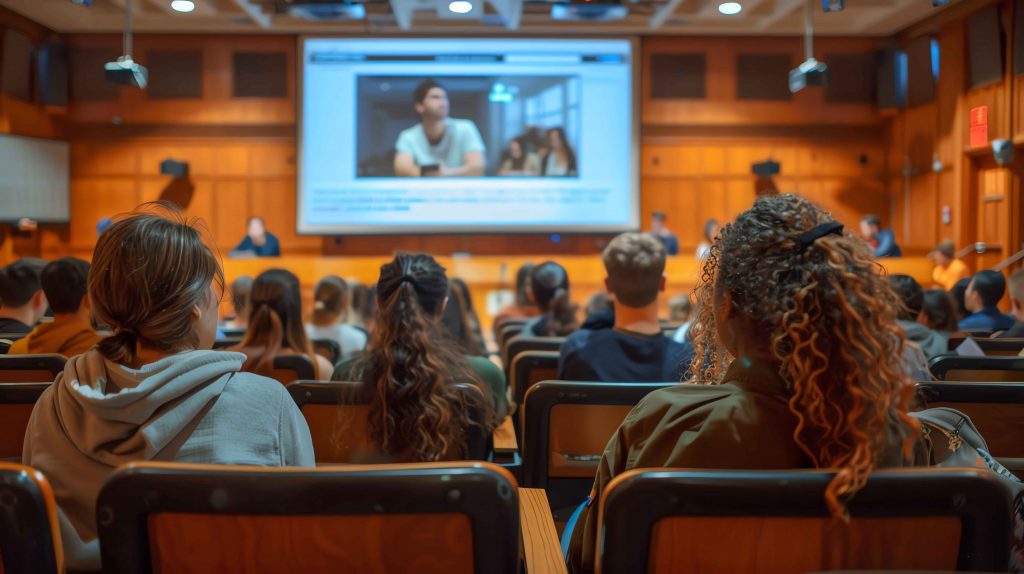Popcorn and Permissions: Understanding Film Licensing for UK Higher Education Screenings

Setting the scene
Have you ever wanted to screen a film on campus? Did you watch a very good documentary and want to share it with a wider audience? Are you part of a film club at the University and want to set up film festivals? You have come to the right place. Continue reading to make sure that you are on the right side of the law.
The Basics of Copyright for Films
Copyright applies automatically in the UK to any type of original work, if it is created by a “natural person”. There is no need for registering works. Copyright is part of the Intellectual Property family, together with trademarks, design rights, patents, etc. Think of it this way, copyright protects anything from a long novel, a small watercolour, a list, a recording of a song and most importantly films, or even a broadcast of a football match.
Copyright owners have exclusive right to prevent or allow others from:
- Copying the work;
- Distributing the work, whether free or for sale;
- Renting or lending the work;
- Performing or showing the work in public;
- Making and adaptation;
- Putting it on the internet.
Let’s have a closer look at films and how copyright applies to them. Films are a recording of a story or event, captured by using different devices, phones, tablets or cameras. If we dig even deeper, we can define film as a series of moving pictures, which are set in a sequence, and tells a story.
They also tend to be a bit more complicated due to their nature of having multiple different types within. Let me explain what I mean. A film may include a soundtrack, which can be protected as a separate work due to it existing as a separate sound recording.
The film will need to exist as a recording to be eligible for copyright protection. For example, a sequence of moving images generated by a computer which are not fixed as a recording will not benefit from copyright protection.
Other copyrights which subsist in films are the rights of performers, both actors as well as musicians.
Now let’s move on and see who the authors of a film are. Again, due to the nature of films, there can be multiple authors:
- Musical score (soundtrack) would be the composers. If the music has lyrics then the author of those lyrics would be sometimes the same ones composing the music, or someone else entirely;
- We have the screenplay writers, who own rights to the screenplay and dialogue;
- The designers of the set, costumes and other visual aspects of the film;
- And the performers, again the actors and musicians, will have their own rights.
However, in general terms, the author of the film, will be either the director or producer of the film.
Why You Can’t Just Show Any Film, Anywhere
As previously mentioned, the copyright owner is the one who allows the performing or showing of a film to the public, distribution and lending. Yes, University staff and students are the public. There are differences between the types of screenings.
Public vs Private Screenings
Showing a movie to the public, which includes University staff and students, is considered copyright infringement, unless the relevant rights and licences have been acquired. However, if you wish to watch a film with your friends in the dorm, that is another matter altogether. That is considered a private screening, and the only license you will require is a TV licence.
The “For Profit” vs. “Non-Profit” Misconception
Many people think that even if they do not charge for entrance, they can screen a film. That is not correct. If you screen a movie, you will need a licence. If you decide to charge for the tickets, you might need a premise licence, but not always. Now, that we know that let’s have a look at film licensing.

The Key to Legal Screenings: Film Licensing
A film licence is pretty much what it says, it is a licence that allows the legal screening of a film. It is basically a permission given by the copyright owner to screen the film in public, while paying a fee.
Licensing films for non-theatrical screenings (which is what we do at the University), can be difficult and complicated at times. However, most films are available through three major film distributors:
- British Film Institute (BFI) – releases new independent or classical re-releases of films in the UK.
- FilmbankMedia – they have both independent films as well as Hollywood blockbusters, they offer options for licensing to help choose the right one.
- Single Title Screening – as the name suggests, it is issued on a title-by-title basis and allows you to screen films from Filmbank’s catalogue.
- Public Video Screening Licence (PVSL) – is an annual licence for premises where films will be shown regularly to a non-paying audience for background / ambient use. You can screen an unlimited number of films from PVSL participating studios and distributors.
- Motion Picture Licensing Company (MPLC) – same as FilmbankMedia, offer a range of films from major studios.
- Single Title MPLC Movie Licence – as the name suggests, it is issued on a title-by-title basis and allows you to screen films from MPLC catalogue, in either commercial (paid audience) or non-commercial (free of charge) environments, using your own DVD or download file purchased from any legitimate outlet.
- MPLC Blanket Licence – another annual licence which covers unlimited showings of films throughout the year from the producers, film studios and distributors that MPLC represent. Please be aware that London Campus currently holds a MPLC Blanket Licence. Only films distributed by MPLC can be shown on London Campus, for other films you will need to get separate permissions and licences.
Other film distributors
Sometimes, the film you want to screen will not be available from the above distributors, in cases such as those, you will need to contact the distributor directly and negotiate a licence or request permission to screen. Please be aware that there will be most likely a fee to be paid.
Remember: even if a film is available to buy or rent for home use, it doesn’t necessarily mean public screening rights are available, as the rights holders may only hold home entertainment, not public screening rights. Clearing rights for public screenings can sometimes be a complex procedure, involving liaising directly with a film’s producer or international sales agent. This is also true for universities and educational use, which we will discuss soon.
Licensing for music in films
Another licence which you need to make sure you have when screening films, is a licence to screen films which contain music. For information, contact the venue in which you want to screen your film.
Films from streaming platforms
There is a misconception circulating that because the content is available, and someone pays for a subscription, we can show it to the public or claim educational use. This is incorrect. These services, such as Netflix, Disney+, Amazon Prime Video etc. are subscriptions which offer home entertainment only and not non-theatrical screening.
Non-original content streamed by these platforms, may potentially be found distributed by either FilmbankMedia or MPLC, and independent features on the platforms could be potentially available to book directly from the independent distributors or producers.
However, films and shows created by Netflix or Amazon etc. are generally exclusive to the platform, although some Netflix original educational documentaries are available for one-time educational screenings. If you decide that you would like to show an original film made by a subscription platform, you might need to get in contact with them and request permission. Please be advised that most likely there will be a licence fee involved.
Showing TV broadcasts that include film
Back in 2016, the law changed a little bit. Now, some of the companies that give permission for showing films in public think that if you want to show regular TV (like your normal shows or even movies that are on TV) to other people outside your home, you might need extra permission called a “broadcast” license. This would be on top of your regular TV license.
It’s a bit like needing a special ticket just for showing TV in public, even if you already have a ticket to watch it at home.
If you’re not sure what you need, the best thing to do is ask the copyright holders, or the TV channel itself for permission. They can tell you exactly what you need to be allowed to show their material to other people. For more information, please see the Intellectual Property Office website.
Screening films online
If you want to stream a film online—whether through your own website or a third-party platform—you must obtain permission from the copyright holder. This type of streaming is not covered by standard home viewing rights.
Contact the relevant film distributor for permission, as well as to supply you with a hi-res digital file and any subtitles to screen from.

Teaching and Educational Purposes
When it comes to showing films for educational purposes, ie. as part of the coursework and module. This type of screening movie will fall under a few exceptions to copyright:
- Illustration for instruction (Section 32) – you can show a film or other video to your students for the purposes of illustration of instruction, the use needs to be fair and sufficient acknowledgement needs to be done.
- Educational performance (Section 34) – showing a film to students and staff of the University as part of their coursework and for purposes of instruction is not a public performance and is not considered infringement. However, this exception is restricted to students and staff at the University and only during normal teaching sessions.
- Recording of broadcasts (Section 35) – this section allows you (within the educational establishment) to record TV and radio broadcasts and make them available to students. You can also use Box of Broadcasts online (sign in required) for this purpose.
For more information on using Audiovisual works in film education, please see Learning On Screen’s Code of Fair Practice. It has a vast array of information and case studies. There are also great resources and curated playlists.

Issues and Challenges with Film Licensing in Higher Education
Any screening outside of regular teaching will require a license which raises a few issues:
- Cost – licences can be prohibitive;
- Complexity – navigating the different bodies and different licensing types can be difficult;
- Timing – getting a licence can take time;
- Limited availability – not all films are available for non-theatrical screening;
- Understanding of the terms – the licence is very specific, so always read the terms and conditions carefully to make sure the licence does what you want it to do.
Top tips for getting it right
- Plan ahead – I guess this one is pretty on the nose, but it has to be said. If you decide to screen a movie last minute, you might find yourself struggling. Always make sure you give yourself at least a few months, especially if the film you wish to screen is an independent film which might not be distributed in the UK for whatever reason and you require extensive permission seeking as well as licensing payments.
- Identify the purpose of the screening – what is the reason for your screening? If you want to charge for tickets, that will determine what licence you can get. Be clear on your purpose.
- Contact the right licensing body – while there are 3 main distributors in the UK, there are smaller distributors of films so make sure you check who distributes your film before you get a licence.
- Keep records – Get and keep permission in writing. This will minimise any potential issues with rights holders. It is also needed as Room Bookings will ask to see permissions or licenses. This is to minimise any copyright infringement.
- Seek advice – if you are unsure, contact your friendly copyright officer.
Conclusion: Screening films responsibly
As you can see screening films (outside of regular teaching hours) can be a bit of a minefield of permission seeking and licensing. However, with the right tools, great planning, and a healthy budget it can be done.
We wish you all enjoyable viewing!

The information contained in this blog post should be taken as recommended advice or guidance but should not be taken as legal advice. If in any doubt please seek proper legal advice.
Open Research
Copyright, Open Access and all things Open Research